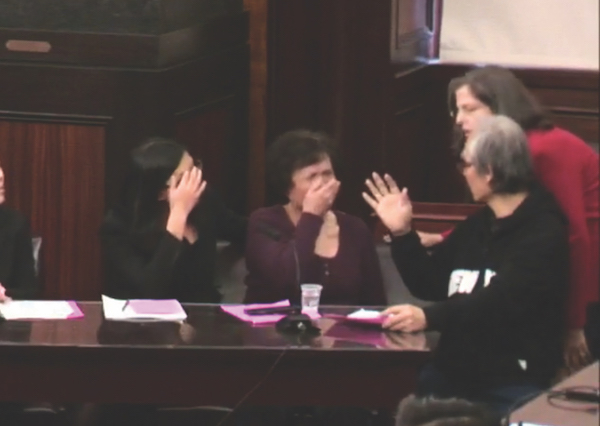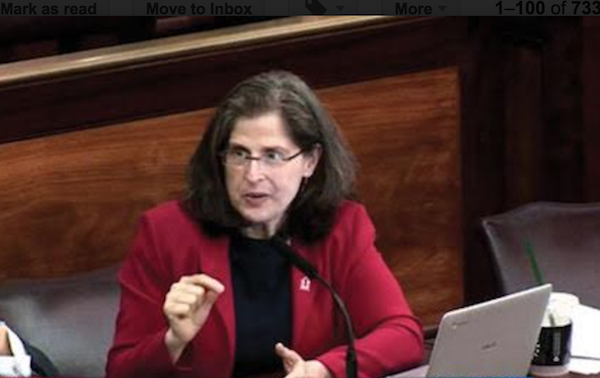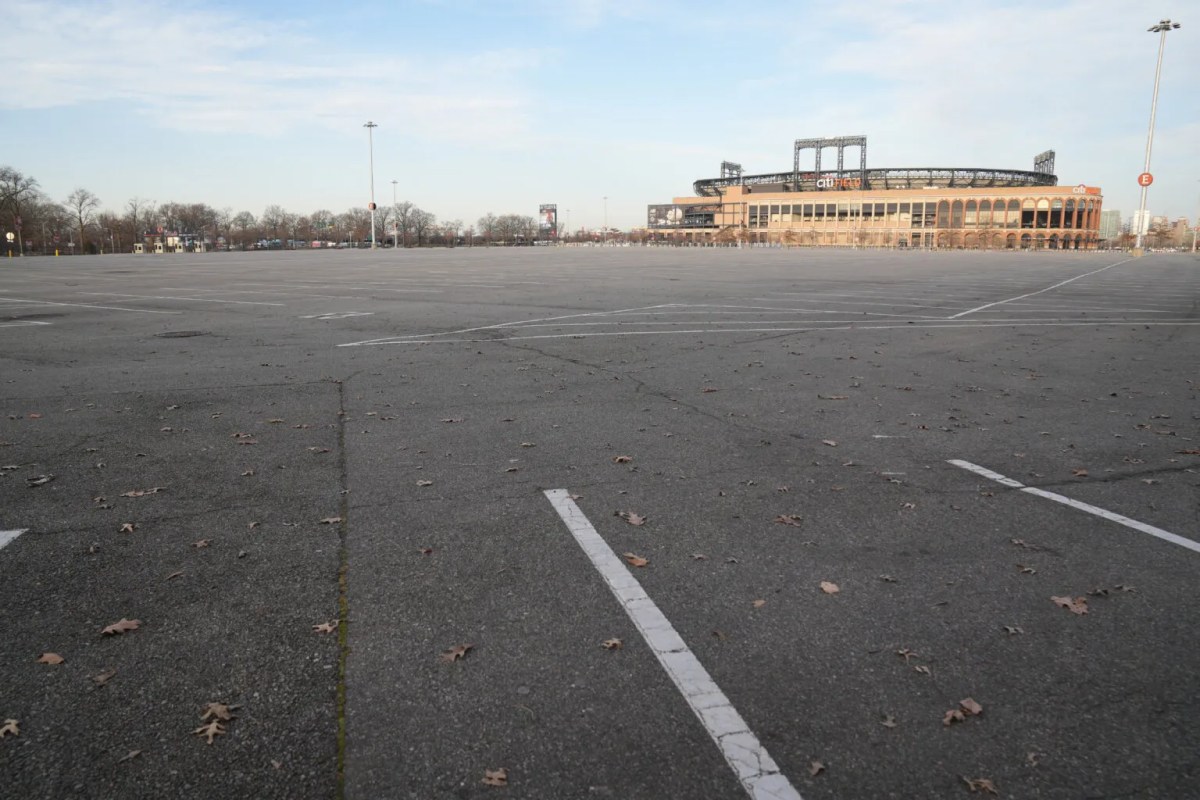
BY SEAN EGAN | When Xiao Ling Chen took her seat before the City Council Housing and Buildings Committee to give testimony in support of several new tenant harassment bills, she was probably not expecting to cry. But, in recent years, her multi-generational family has been crammed into just two rooms downtown due to extensive and invasive construction, been subjected to mold and insects, and suffered broken furniture and appliances at the hands of building management making minor repairs. As she began to get emotional, and the tears started falling, Upper West Side Councilmember Helen Rosenthal and her Brooklyn colleague Jumaane Williams approached her to help calm her down. She quickly excused herself from the chambers, but more than a dozen witnesses behind her were armed with similarly gut-wrenching accounts of rampant tenant harassment.
“It shouldn’t be this hard,” Rosenthal told this reporter in an interview several days before the April 19 hearing. “I heard a story about a community board meeting that a tenant was at. It was a land use meeting, and an architect was presenting information about a building that was to be gutted because it wasn’t occupied and the work that he was going to be doing — at which point the tenant stood up and said, ‘Hey, wait a minute; I live in that building.’”
The committee’s hearing agenda included discussion of five measures which are part of or related to a larger package of bills known as “Stand For Tenant Safety,” designed to help combat such tenant abuse.
“My office, every year, we see roughly between three and five thousand cases; 80 percent of those cases are related to tenant harassment, in one form or another,” Rosenthal said of the package, which includes bills she authored. “This legislation is, from my perspective, a package of ideas to help move the ball forward to help these tenants. They’ve been written because of the situations that we’ve seen.”
Among the measures discussed for the first time were Rosenthal’s Intro. 347-A, which would grant Housing Court judges the ability to award damages and attorney fees for tenant harassment actions. Perhaps most notable among the measures, however, is Rosenthal’s Intro. 1523, which would create the office of Tenant Advocate in the Department of Buildings (DOB).
“It tasks them with approving the [tenant protection plans], site safety plans, and communicating with residents about construction,” Rosenthal explained about the potential office. “It could be an incredibly helpful tool for tenants who are trying to get a response out of the Department of Buildings.”
She continued, “I think opening government to residents is critical, and it shouldn’t be the case that only a councilmember can get through to the Department of Buildings. Tenants are being harassed all the time, and they should know that they have an advocate inside the Department of Buildings that they can access and where they can get straight talk and information. We haven’t seen that before.”
In an email message, Ryan Monell, a spokesperson for Bronx Councilmember Rafael Salamanca, who is a co-sponsor of the Tenant Advocate measure, said, “We speak to tenants every day from our district who are living in unsafe conditions, are being harassed by their landlords, or simply do not understand their rights as tenants. Having a singular office that can assist with many of the concerns we see would be tremendously helpful to many, notably those in immigrant communities.”

The concerns raised by Rosenthal and Monell were echoed loudly and frequently, by councilmembers and members of the public alike, at the April 19 hearing, where representatives of the DOB and the Department of Housing Preservation and Development (HPD) were on hand to voice their views on the bills as currently written. Sitting on the panel and fielding questions were Thomas Fariello, the first deputy commissioner, and Patrick Wehle, the assistant commissioner for external affairs, for the DOB, and, from HPD’s Office of Enforcement and Neighborhood Services, its deputy commissioner, Vito Mustaciuolo, and assistant commissioner, Deborah Rand.
While these agency representatives expressed an eagerness to improve their protection of tenants and applauded the councilmembers’ initiative, they raised a number of concerns about the package of bills. Regarding Intro. 347-A, Rand and Mustaciuolo questioned the authority and effectiveness of Housing Court in adjudicating tenant harassment liability, suggesting that might be more appropriately handled in civil court, despite Rosenthal’s protests that additional trips to court would be a hardship for most tenants facing harassment.
They also expressed trepidation over the broadness of the language in Intro. 1549, which would allow tenants to establish a landlord’s bad conduct as “repeated” by citing even actions not specifically directed at them, and Intro. 1548, which would define repeatedly contacting or visiting a tenant at unusual hours as a form of harassment.
In response to Intro. 3 — which would allow HPD to make building owners place funds in an escrow account against the potential for tenants having to relocate during construction — Mustaciuolo endorsed the sentiment of the bill, but questioned the feasibility of managing hundreds of escrow accounts. Similarly, the DOB reps explained, the watchlist of “bad contractors” who’ve worked without proper permits proposed by Intro. 938 was an idea they endorse, but also believe would likely not be particularly effective since contractors are rarely on-site once construction is complete and inspections take place.
On all of these issues, however, the agencies pledged to continue working with the Council to find ways to meet the aims of the proposed legislation.
More contentious, however, was the discussion surrounding Intro. 1523, with the DOB representatives staunch in their assertion that their department did not need to create an office of Tenant Advocate.
“Creating a new office as described in the bill will create no improvement,” said Fariello, and he explained the DOB has plenty of avenues for tenants to contact the department and file complaints and that much of the work the Tenant Advocate office would do — including ensuring tenant protection plans are in place and being followed — are already handled elsewhere in the agency. According to Wehle, “adding another layer” to existing processes in place would create more difficulty for tenants and the DOB.
“What this office would do is give the DOB a public platform with which to counter the building owners that are doing things that might be structurally sound, but are obviously construction as harassment,” Rosenthal rejoined. “So why not? If you’re already doing the work, why not have a platform?”
On multiple occasions, passions ran high in the Council chambers. Brooklyn Councilmember Stephen Levin blasted the DOB’s 40-day turnaround period for conducting inspections in response to tenant harassment complaints.
“It’s not acceptable and it’s not an effective deterrent,” he emphasized, despite protests from Wehle that from a practical standpoint it often takes only 20 or so days to complete such an inspection. Councilmember Williams, who chaired the hearing, was forced to bang the gavel at Rosenthal, who ignored her time limits while carrying out an impassioned grilling of the agency representatives. And, on multiple occasions, Williams had to politely chide the sign-waving and applauding crowd assembled.
Williams himself, though, had his own moment of emotional incredulity while defending his Intro. 1156, which would increase minimum civil penalties in harassment cases — something, Mustaciuolo argued, that might dissuade judges from finding landlords guilty of harassment.
“Let’s do the math real quick,” Williams said, pausing the proceedings to crunch the numbers HPD reps provided of successful harassment cases brought against landlords from 2014 through 2016 — revealing “appalling” and “absurd” figures in the one- and two-percent range. “Thank you for all the work you’re already doing,” Williams said at the end of the questioning period. “But obviously it’s not working.”
The public testimony section was similarly passionate, and served as a strong rebuttal to the DOB and HPD reps’ downplaying of the issues’ severity and highlighted those agencies’ shortcomings in enforcing existing regulations. Panel after panel of wronged tenants offered anecdotal evidence lending credence to the councilmembers’ claims of widespread harassment, while uniformly endorsing the overall package of reforms.
Gilbert Sabater, a resident of East 86th Street, noted that in his building, which has 300 units under rent regulation, “We’ve been under constant construction for 30 months.” He catalogued noisy early morning construction, asbestos and dust issues, and inefficient DOB inspections where the contractors downplayed the breadth of the work they were doing and got let off without being cited for infractions.
“If that’s not harassment, I don’t know what is,” Sabater said.
Xiao Ling Chen, the woman who broke down in tears before the councilmembers, regained her composure and re-entered the chamber, translator at her side, to tell her story about her “nightmare.” For nearly two years, she recounted, her three grandchildren, all under 10, have been cramped on beds placed out in her living room — while she sleeps on a couch — the harsh living conditions impairing the children’s ability to complete their homework.
“We’ve become human vacuum cleaners,” Chen said. “The only way I can describe the dust that’s in my apartment is it’s like a dust storm in Beijing.”
That was exactly the kind of story that has incensed the City Council to try to push the package of reform bills through as quickly as possible — to empower tenants and to make the ill-acting landlords pay.
“How can we get someone who is lying to actually go to jail? Because fines are not enough,” Lower Manhattan Councilmember Rosie Mendez said early in the hearing. “There need to be real repercussions.”



































